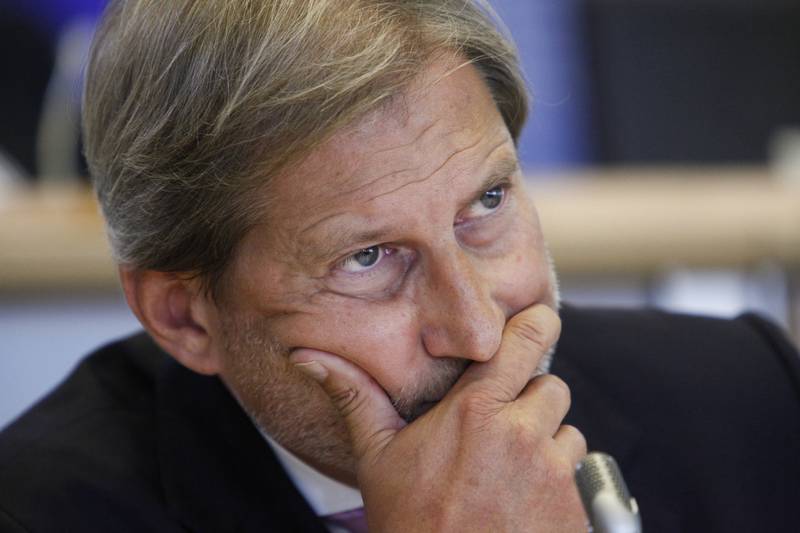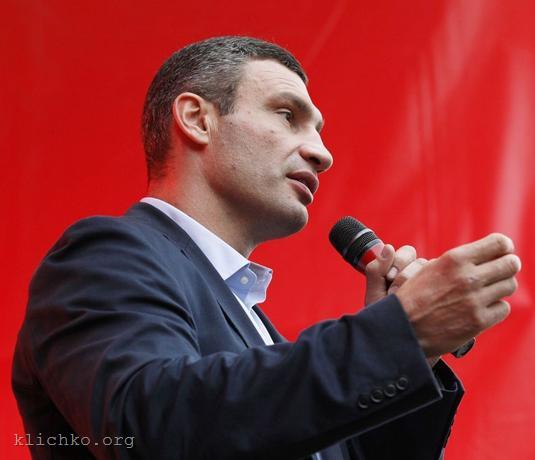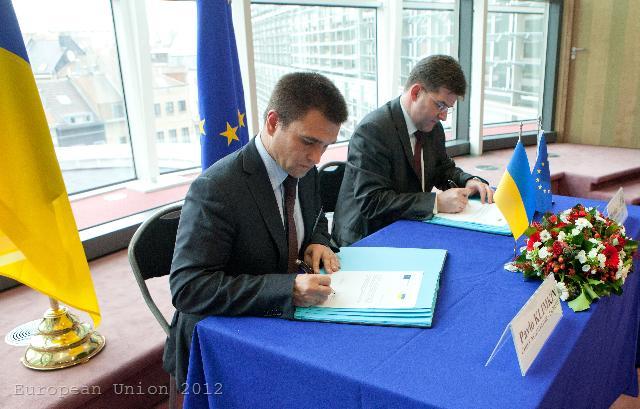The Tymoshenko Trial - Between the Hammer and the Anvil
Adelina Marini, October 13, 2011
 A country has managed to reform or at least to walk in a sustainable way on the path of reforms only when there are no doubts in its actions. Alas, the case against the former Ukrainian prime minister and opposition leader, Yulia Tymoshenko, from the outset is feeding doubts that this is a politically motivated trial, the outcome of which remains vague. Moreover, this trial is being closely followed around the world, but especially in the two main sources of pressure over Ukraine - the European Union from the west and Russia from the east.
A country has managed to reform or at least to walk in a sustainable way on the path of reforms only when there are no doubts in its actions. Alas, the case against the former Ukrainian prime minister and opposition leader, Yulia Tymoshenko, from the outset is feeding doubts that this is a politically motivated trial, the outcome of which remains vague. Moreover, this trial is being closely followed around the world, but especially in the two main sources of pressure over Ukraine - the European Union from the west and Russia from the east.
Who is benefiting from the trial of Mrs Tymoshenko?
The former Ukrainian prime minister, also known as a symbol of the Orange Revolution in Ukraine of 2004, but also as the gas princess, has been sentenced in a Kyiv court to seven years in prison. This is as much as the prosecution asked for for abuse with power when signing a contract for gas deliveries with Russia in 2009. According to the prosecution, Tymoshenko ordered the state energy company Naftogaz to sign a contract with Gazprom in 2009, thus causing damage to the state. Justice Rodion Kireev had still not published the motives for his judgement when the international reactions followed, including that of Tymoshenko herself.
From the video footage it is clearly visible that her recent confidence has yielded to surprise, desperation and perplexity. After the announcement of the sentence she said that it was not Justice Kireev who announced this sentence but President Yanukovich.
In a statement EU High Representative for Foreign Affairs Catherine Ashton expressed disappointment with the sentence and specified that "the verdict comes after a trial which did not respect the international standards as regards fair, transparent and independent legal process which I repeatedly called for in my previous statements. This unfortunately confirms that justice is being applied selectively in politically motivated prosecutions of the leaders of the opposition and members of the former government".
Lady Ashton also urged Mrs Tymoshenko's right to appeal not to be taken away by imposing restrictions to her ability to stand in future elections in Ukraine, including the parliamentary elections next year. Moreover, the High Representative said that the EU would reflect on its policies towards Ukraine. European Commission President Jose Manuel Barroso also expressed disappointment and called, with the appeal, Ukraine to respect the rule of law, the fundamental rights and the independence of the judicial system. "As we made clear to President Yanukovich when we met him in Warsaw recently the level of economic integration with the European Union, and also the level of how close we will be going in terms of political association, is also a response to the level of respect of human rights in Ukraine", Barroso said in a special statement.
He has in mind the meeting which EU leaders had with Ukraine in the framework of the summit between the EU and the Eastern Partnership (EaP) countries in the end of September. Ukraine is expecting visa liberalisation and lucrative trade conditions from the EU, but they were preconditioned by the community in return for a fair and impartial process against Tymoshenko, as well as for implementation of the criteria for rule of law, human rights and independent judiciary.
The developments of October 11 around Tymoshenko did not prevent the Ukrainian foreign minister, Kostyantyn Gryschenko, to state, during a special hearing in the European Parliament in Brussels, that EU integration remained a major priority for Ukraine, which the country did not consider granted. "Ukraine's ambition is to become a full fledged member of the EU. It is enshrined in Ukraine's law on internal and foreign policy foundations, supported by the majority political forces in Ukraine and society as a whole". Mr Gryschenko urged the Association Agreement to be signed in the end of the year because it was a tool and a roadmap for more democracy and more respect of human rights.
Gryschenko was heavily criticised by the members of the Foreign Affairs Committee in the European Parliament who said that Tymoshenko's trial was an unacceptable political interference and that via this process Ukraine was heading toward the non-existent Soviet Union, turning its back on Europe. Gryschenko, on his part, said that he could not comment on the decision of an independent court and added: "And there is no reason in a democracy to believe that anyone specifically has a special, overriding right to have special treatment in the case where there are reasons to believe that criminal act was committed".
The Russian reaction was also quick and was very sharp, both to Ukraine itself and to the international reactions. In a statement the Ministry of Foreign Affairs points out that Russia respects Ukraine's sovereignty and the independence of the Ukrainian judiciary. "Yet one cannot fail to take into account the fact that leaders of many states and the world public perceive this entire judicial process as initiated for purely political reasons". According to the Russian ministry, the very reason for charging Yulia Tymoshenko is not justified because the court has ignored compelling evidence that these gas deals are in strict accordance with the laws of Russia and Ukraine and the applicable rules of international law.
"Neither can we fail in this context to mention the obvious anti-Russian subtext in this story. In fact, Tymoshenko was tried for the legally binding agreements in force between Gazprom and Naftogaz Ukraine that no one has ever cancelled". Further in the statement Russia reiterates its commitment for deepening of the partnership with Ukraine, including in the search for mutually acceptable solutions in the gas sector. The statement ends with the sentence: "The contracts must be fulfilled". This rhetoric is probably very well known to the Bulgarian public who is almost entirely dependent on the Russian gas deliveries and the Russia-Ukraine relations.
What the European Union has to do for sure is not to hurry signing the agreement with Ukraine no matter that it is very beneficial for the union itself and for the opening of new markets. Next year's elections in Ukraine are very important not only because they will demonstrate Ukraine's commitment to fill its words with content but also from the perspective of the fact that in Russia there will be presidential elections and the main candidate again is Vladimir Putin. And those who benefit from the "Tymoshenko" case are only the regressive forces - those who strive to keep the status quo. And if we judge from the reactions of both Brussels and Moscow it is more than clear that this trial is not independent. Or, if anything, its consequences will reverberate strongly.
 Johannes Hahn | © European Parliament
Johannes Hahn | © European Parliament | © klichko.org
| © klichko.org | © European Union 2012
| © European Union 2012